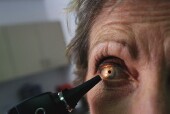- The Best Time of Day to Drink Bone Broth to Maximize Health Benefits
- 8 Ways to Increase Dopamine Naturally
- 7 Best Breads for Maintaining Stable Blood Sugar
- Gelatin vs. Collagen: Which is Best for Skin, Nails, and Joints?
- The Long-Term Effects of Daily Turmeric Supplements on Liver Health
- Could Your Grocery Store Meat Be Causing Recurring UTIs?
- Are You Making This Expensive Thermostat Error This Winter?
- Recognizing the Signs of Hypothyroidism
- 10 Strategies to Overcome Insomnia
- Could Artificial Sweeteners Be Aging the Brain Faster?
Animal Trials Show Promise for Treating Eye Cancer


New findings about the genetic roots of eye melanoma could lead to more effective treatments, scientists say. They also report an existing drug shows benefits as a treatment for eye tumors in mice.
So-called uveal melanoma — cancer that attacks parts of the eye that contain pigment cells — affects about 2,000 people in the United States each year. If the cancer hasn’t spread, patients usually undergo radiation treatment and have the affected eye removed. Oftentimes, however, the cancer spreads to the liver and quickly kills patients.
The study, published in the May 29 online issue of the journal Cancer Cell, offers insight into genetic mutations found in about 70 percent of the eye tumors. It also reveals a pathway that could be a target for medications.
The researchers suggest an existing drug, verteporfin (brand name Visudyne), could be a possible treatment. Tests on mice are promising, the study authors noted.
“The beauty of our study is its simplicity,” said study co-author Kun-Liang Guan, professor of pharmacology at University of California, San Diego Moores Cancer Center. “The genetics of this cancer are very simple and our results have clear implications for therapeutic treatments for the disease.”
This cancer is “caused by a very simple genetic mechanism,” Guan said in a university news release. “And we have a drug that works on this mechanism. The clinical applications are very direct,” Guan added.
However, results achieved in animal studies are not always replicated in humans.
More information
For more about melanoma of the eye, visit the U.S. National Library of Medicine.
Source: HealthDay
Copyright © 2026 HealthDay. All rights reserved.










